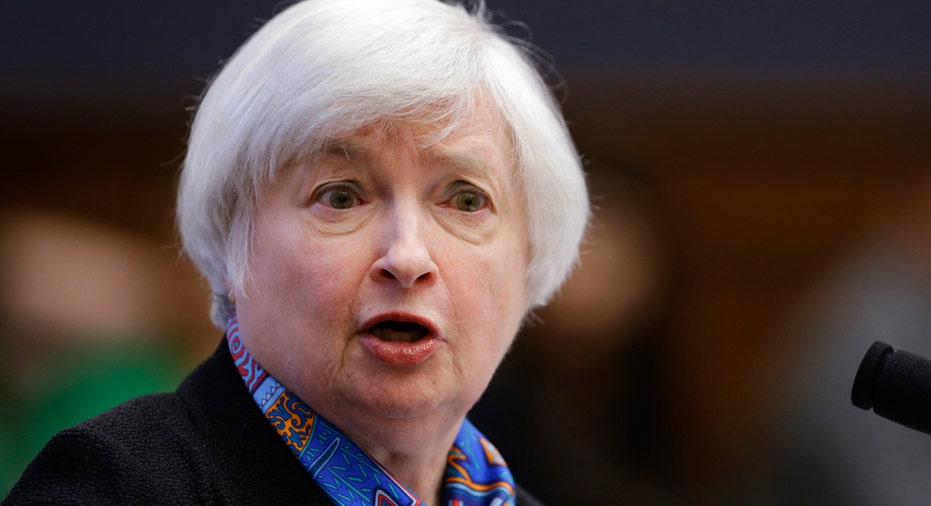The U.S. Election Puts Central Banks in Hot Seat

Central banks across the developed world are facing a tough stretch: Months of political events -- chief among them Tuesday's U.S. election -- that will put their loose policies and their independence in the crosshairs.
If monetary policy becomes politicized, investors worry, financial-market turmoil could follow.
"Stuff will come to pass if central bankers are seen to be too political, " said Paul Griffiths, chief investor at London-based First State Investments. "That can be quite damaging."
With economic figures coming in strong, markets price in a 72% probability that the U.S. Federal Reserve will nudge up interest rates in December. But some warn that a presidential victory by Donald Trump could upset such expectations, because of his repeated accusations that Fed Chairwoman Janet Yellen is keeping borrowing costs "artificially low" to benefit Democratic nominee Hillary Clinton.
"With his election campaign tirades, Trump undermines the Fed's standing, " said Ulrich Leuchtmann, currency analyst at German lender Commerzbank AG. "It would therefore be quite understandable if in case of a Trump election victory it postponed a rate hike that was actually due."
While Ms. Yellen has denied any influence of "partisan politics" in the Fed's decisions, many analysts think attacks on central bankers could resonate.
Since the financial crisis, central banks in developed nations have deployed unprecedented waves of monetary stimulus, which have been effective at parrying financial shocks but have failed to significantly boost economic growth. Policies like government bond-buying, known as quantitative easing or QE, threaten to tear down the walls between politics and central banks -- in Japan, many analysts argue they have already been breached under Prime Minister Shinzo Abe's economic reflation plans.
But the growing prominence of central bankers could itself be a double-edged sword: It may now set them up to take the fall for the economic ills that have fueled populist movements all around the world.
Were the independence of central banks really reduced, "the consequences would be higher risk premia in markets across the board," said Valentijn van Nieuwenhuijzen head of strategy at Dutch asset manager NN Investment Partners.
While few investors foresee a sudden end to central-bank independence, they fear a war of attrition.
During the Conservatives' party conference in October, U.K. Prime Minister Theresa May criticized the central bank's bond-buying scheme for its role in fostering wealth inequality. Shortly thereafter, Michael Gove -- until recently a cabinet minister -- said that "the era of their much-vaunted independence will come, possibly quite dramatically, to its end."
The U.K. government has denied any plans to take away the central bank's autonomy, granted in 1997, but BOE Gov. Mark Carney faced tough questions during the referendum campaign, after he warned that leaving the European Union would have bad economic consequences.
"We are not going to take instruction on our policies from the political side," Mr. Carney said in a speech last month. On Thursday, he denied feeling under any political pressure.
Nevertheless, investors are pondering whether political pressure -- together with tentative signs of returning inflation -- will push policy makers to deliver less stimulus. As a result, 10-year sovereign bond yields have risen roughly 0.3 and 0.5 percentage point in Germany and the U.K. respectively over the past month.
"We are in a calendar now with huge amounts of political events," said Martin Horne, head of European high-yield investments at Barings. "We believe it will subdue a pace of aggressive monetary policy."
Indeed, the European Central Bank is facing a complicated schedule. Next year, euroskeptic parties in France and Germany are expected to pose a challenge to the ruling governments. Because of his easy-money policies, ECB President Mario Draghi has long been politically contentious in saver-fixated Germany.
Earlier this year, German finance minister Wolfgang Sch�uble accused the central bank of being responsible for "50% of the results" that the right-wing Alternative for Germany garnered in regional elections. Right after, Bundesbank President Jens Weidmann, a longtime critic of easy money inside the ECB, stepped up to defend the central bank's independence.
Mr. Draghi has also subtly backed some of the policies of Italy's reformist Prime Minister Matteo Renzi, such as the need for fiscal policy or providing a taxpayer backstop for the country's troubled banks -- both of which EU officials oppose. Mr. Renzi risks being severely weakened in December if he loses a referendum on constitutional reform.
For about 20 years, mainstream economists have supported making central banks independent inflation targeters, aiming to fend off temptations by politicians to make credit cheaper ahead of elections. Most investors are keen for monetary policy to be unaffected by politics as well, because it makes market moves more predictable.
Some economists, however, have now started to question the status quo, arguing that coordinating money-printing and government spending would deliver the potent stimulus the economy needs.
Riva Gold contributed to this article
Write to Jon Sindreu at jon.sindreu@wsj.com



















